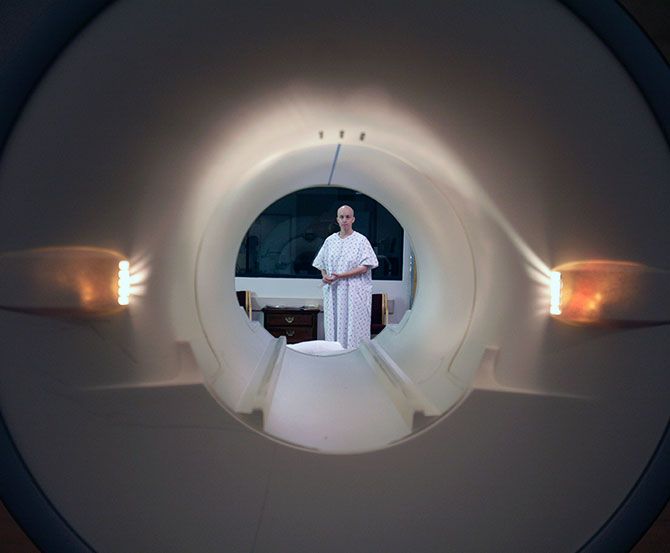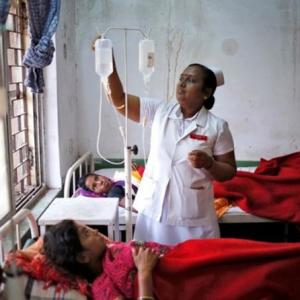Preventive health care for women should never be ignored, says Angeli Misra.

IMAGE: Breast. Lung. Colorectal. Cervical and Stomach. These 5 cancers are the top killers for women, according to WHO. Photograph: Pilar Olivares/Reuters
Women are the centre pillars of all families.
Should the burden of sickness fall on her, in a family, it can alter the entire equation within a household -- physically, emotionally and financially.
Over the years the causes of mortality and morbidity have changed from infective diseases like tuberculosis to chronic diseases like heart disease, diabetes and cancer.
These diseases can be easily prevented if one understands the risk factors.
If the risk factors are managed these diseases can be easily controlled.
Preventive health screening for women is simple and non-invasive.
These include tests for general wellbeing and specific tests for cancers.
A complete blood count, along with liver function profile and kidney function profile, is required to know how the various systems in the body work.
Lipid profile is very essential to estimate the levels of good and bad cholesterol.
A high level of cholesterol will indicate a higher possibility of atherosclerosis and blockage of the vessels.
In addition to these, an estimation of thyroid hormone is also essential, as it plays a role in the functioning of all the cells and tissues in the body.

IMAGE: Women should begin cervical cancer screening at the age of 21. Between the ages of 21 and 29 they should do a pap test every three years. Photograph: Pilar Olivares/Reuters
Women should also screen themselves for cancers like cervical and breast.
There are two types of tests used for cervical cancer.
The pap test finds early pre-cancerous changes in the cells. These can be easily treated.
Regular pap screening can also find cervical cancer early and hence the treatment is better and more effective.
The HPV (human papilloma virus) infection is a well-established cause of cervical cancer.
Women should begin cervical cancer screening at the age of 21.
Between the ages of 21 and 29 they should do a pap test every three years.
Between the ages of 30 and 65 they should do both a pap test and an HPV test every five years.
Women over the age of 65, who have had regular screenings with normal results, should not screen themselves for cervical cancer.
Those who have had their uterus and cervix removed, and have no history of cervical cancer or pre-cancer, should also not have themselves screened.
Those who have taken HPV vaccination should still follow the screening recommendations for their age group.
The other most common cancer is breast cancer.
It is strongly recommended that women with an average risk of breast cancer should undergo regular mammography starting at the age 40.
Those who are between the age of 40 to 54 should be screened annually.
Women of 55 and older can have biennial screening or can continue screening annually.
In addition to these, tests for tuberculosis are important. A chest x-ray and a Mantoux skin test (a tool for screening for tuberculosis) also needs to be done at least once in two years.
Angeli Misra is the co-founder of Lifeline Laboratory, which has labs across the Delhi and the NCR.










